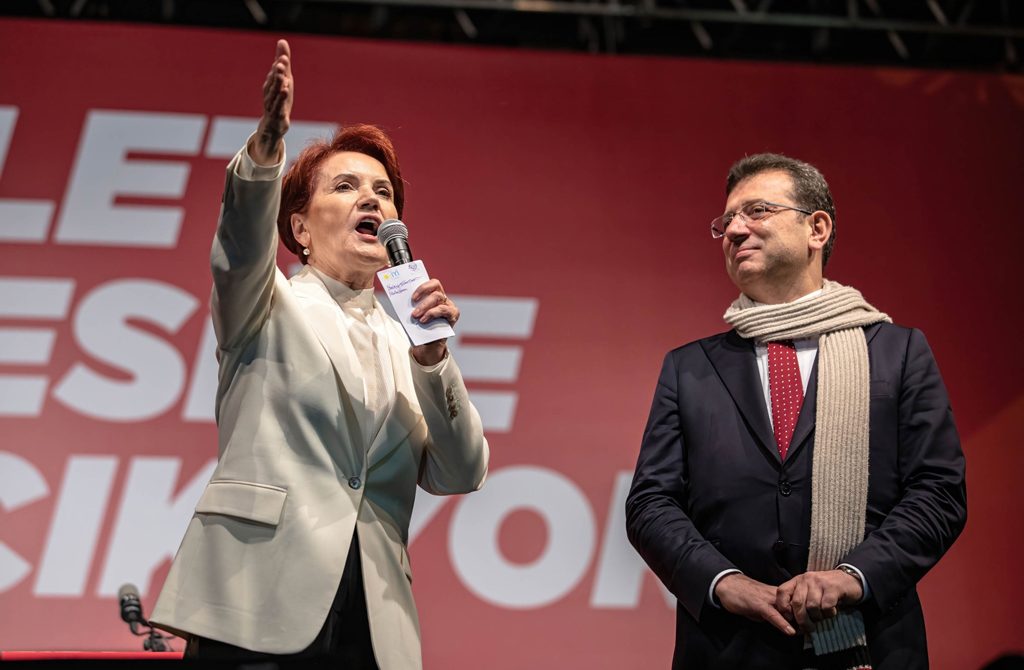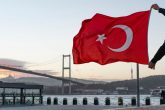The tug of war between the main opposition Republican People’s Party (CHP) and the Good Party continues over the selection of a presidential candidate. My sense is that the latter faces a “lose-lose” situation.
It is no secret that the Good Party’s (IP) Chairperson Meral Akşener has been trying to portray the mayors of Istanbul and Ankara as “electable” presidential candidates for two years. By contrast, the CHP Chairperson Kemal Kılıçdaroğlu patiently and repeatedly established that his party won’t endorse those potential candidates.
In a televised interview on Dec. 23, Akşener doubled down on her approach, which has fueled a power struggle within the CHP.
In that interview, the IP chairwoman accounted for her appearance at the Saraçhane rally – for which critics accused her of stealing Kılıçdaroğlu’s spotlight – with reference to strong leadership. She also made an important argument regarding the opposition bloc’s presidential candidate: “I don’t need to request permission from anyone. I will hurt whoever says such things. Whose permission shall I seek (to meet) a mayor whom we got elected?”
What an unequivocal statement!
The mayors of Istanbul and Ankara, Ekrem Imamoğlu and Mansur Yavaş, respectively, ran on CHP tickets but won their races thanks to the IP’s support. Right now, they are in the middle of a fight over which party “owns” them. If Akşener walks away from this fight, she won’t be able to explain to her party’s members why the alliance primarily serves the CHP’s interests.
The main problem is that the CHP hailed Imamoğlu as a “savior” after the 2019 municipal elections and the IP argued that they, too, had supported him. Meanwhile, Istanbul’s mayor cozied up to many groups, positioning himself as the opposition’s “natural presidential candidate” – which compelled Kemal Kılıçdaroğlu to get bogged down in a power struggle within his own party.
Having successfully de-escalated tensions fueled by a Turkish court’s verdict regarding Imamoğlu, the CHP chairperson forces Akşener to make some tough decisions.
At this point, several questions come to mind:
Akşener could not persuade Yavaş to get involved. Nor could she stop Imamoğlu from being sidelined. Will she allow Kılıçdaroğlu to impose himself as the opposition’s joint presidential candidate?
Could Akşener endorse the CHP chairperson as the alliance’s candidate?
How would she respond if Kılıçdaroğlu were to propose a non-CHP – and, possibly, non-alliance – candidate instead of himself?
Under those circumstances, won’t Akşener look like a problem maker at the “table for six”?
Union or not?
Having publicly refused to support Akşener or Yavaş, the Peoples’ Democratic Party (HDP) clearly favors Kılıçdaroğlu. At the same time, that party asks the opposition bloc to meet certain demands – assuming that it could be the kingmaker. Among those demands is the creation of a “principled and publicly acknowledged union.”
Obviously, Akşener, more than any other opposition leader, would be unhappy with the HDP telling the “table for six” to meet their demands, including a second native language, in exchange for endorsing any presidential candidate. Likewise, the possibility of Kılıçdaroğlu winning the presidential race with the HDP’s support would entail serious problems for the IP chairwoman.
Handing over the country to the CHP and the HDP would obliterate all of Akşener’s political dreams as the leader of the most popular right-wing party within the opposition bloc.
Right now, Akşener faces the risk of failing to use her party’s prominent position within the “table for six” to determine the outcome of the selection process. Over the next months, a situation may arise that looks like the 2019 municipal elections – where the CHP received many benefits and the IP settled for symbolic gains. It is impossible for Akşener to ask the opposition bloc to endorse her as the joint presidential candidate either. (A decision to field multiple candidates would not solve her problem.)
Another option is to leave the opposition bloc, which would be inexplicable, as Akşener would be blamed for an election loss.
In the 2023 election, as in 2018, the IP chairwoman’s preferences may determine the opposition’s presidential candidate(s). Nonetheless, Akşener will continue to be troubled by two serious questions: the HDP’s impact and the joint candidate.
It remains to be seen whether she can find a way out of the “lose-lose” trap.
In this article
- Opinion
- 14 May 2023 Turkish General Election
- 2023 Turkish General Elections Presidential Candidates
- 2023 Turkish Presidential Election
- Daily Sabah
- Ekrem Imamoğlu
- Kemal Kılıçdaroğlu
- Mansur Yavaş
- Meral Akşener
- Table for Six | Turkish Opposition Alliance
- Türkiye's 2023 Elections
- Türkiye's Good Party (IP)
- Türkiye's Good Party (IP) Chairperson



